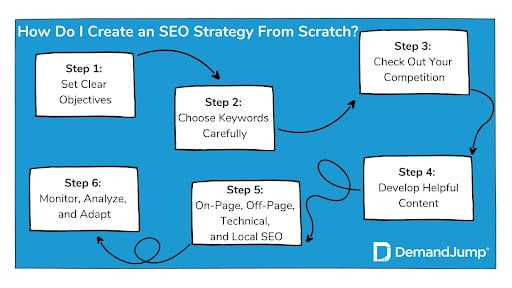How Do I Write an SEO Plan?
June 12, 2023 •Allison Lemasters

Writing an SEO plan is a strategic dance of creating captivating content while appealing to the finicky tendencies of search engine algorithms. Within the intricate choreography of SEO strategy, you must utilize keywords, build logical site structure, and weave an enchanting web of optimization that beckons search engines and places you at the top of search engine result pages (SERPs).
But what should be included in an SEO plan, exactly? Writing an SEO plan is no small feat and can be downright intimidating. In this blog, we’ll delve into the art and science of captivating search engines with a finely tuned SEO plan. Whether you’re seeking a comprehensive 6-month SEO plan or a condensed timeline, you’ll find the key components and insights needed to propel your website to greater visibility.
How Do I Create an SEO Strategy From Scratch?
Creating an SEO strategy in digital marketing from scratch requires careful planning and deliberate execution. Below are the vital steps any business should incorporate into its SEO action plan template:

1. Set Clear Objectives
You’ve heard it once, you’ve heard it a thousand times—you must set clear goals before embarking on any new plan for your business. In a highly influential scientific study cleverly titled “Should entrepreneurs plan or just storm the castle?” researchers proved the high value of planning and its ability to improve business performance. So while you could storm the castle, it likely won’t end with the result you wanted.
SEO is no different. Set specific goals for your SEO efforts, such as a certain percent increase in organic traffic or conversions. To set realistic expectations, check out these examples of companies using SEO with Pillar-Based Marketing (PBM)—an innovative content strategy—for some mind-blowing results.
2. Choose Keywords Carefully
“Keywords” are specific words or phrases that reflect the search terms users are likely to enter when looking for information online. By strategically integrating them into your website, you signal to search engines that you understand the language your target audience speaks and have valuable content to offer.
This approach boosts your visibility in search results and helps search engines match your website with the right users, leading to increased organic traffic and potential conversions. To identify ideal keywords, use a keyword research tool—like DemandJump—to discover search volumes, competition levels, and more.
3. Check Out Your Competition
You can’t outrank your competition on SERPs if you don’t know what they’re up to! Analyze the SEO strategies of your competitors to gain insights and identify areas of opportunity.
For example, imagine you’re in the business of selling outdoor recreational equipment, and you’ve set your sights on conquering the search engine rankings for the coveted keyword phrase “waterproof backpacks for hiking.” But hold on—one of your competitors has already claimed the top spot!
Time to embrace your inner sleuth and dive deep into that webpage sitting pretty at number one. What’s their secret sauce? Take note of the specific keywords they’re using around hiking backpacks. Do they have a web of content linking to other pages, like product listings or helpful hiking guides? By unraveling their SEO tactics, you can unlock the secrets to their success and formulate your own winning strategy to surpass them.
4. Develop Helpful Content for Web Crawlers and Humans
Now comes the more time-intensive task of SEO—creating content that satisfies your human readers and search engine web crawlers.
Web crawlers are the tireless bot minions of search engines, scurrying through the vast digital jungle, sniffing out information, and reporting back to their search engine overlords with their spoils of web data. This process is how search engines collect data and decide which websites should rank and in what order. To appease these bots, ensure your content is easily accessible and organized, utilizing descriptive headings, meta tags, and a well-structured layout that web crawlers can easily navigate.
Of course, you also want to craft compelling and engaging content that provides value, answers questions, and solves problems for your human audience. Ultimately, search engines aren’t buying your service or product—it’s the people reading your content. Even Google has noted this with its helpful content update, which encourages businesses to write original content for people first to rank higher on search engines.
How many hours per week does SEO take for content creation? That depends on the size of your writing crew and the amount of writing mojo you can muster. To give you a rough estimate, our DemandJump writers have discovered that whipping up a 750-word blog can devour anywhere from two to five hours. Of course, the complexity of the topic can stir up a bit of extra work, so keep that in mind.
5. Do On-Page, Off-Page, Technical, and Local SEO
When implementing your SEO strategy, don’t forget to cover the four main pillars of SEO—on-page, off-page, technical, and local SEO.

- On-page SEO involves optimizing your website’s content, meta tags, and internal links. How do you do on-page SEO step by step? Read about on-page SEO more in-depth here.
- Off-page SEO focuses on building quality backlinks and establishing your website’s authority through external sources. Learn more here.
- Technical SEO ensures that your website is properly crawled and indexed by search engines, addressing factors like site speed, mobile-friendliness, and structured data. Dive deeper here.
- Local SEO targets geographically specific searches, optimizing your online presence for local directories, reviews, and maps. Read more here.
6. Monitor, Analyze, and Adapt
To secure the success of your SEO strategy, you must continually monitor, analyze, and adapt your approach. If you have pages that aren’t ranking that well, dive into the data and figure out why. Is the content still relevant, or does it need to be refreshed? Are you getting tons of traffic to one webpage, but the bounce rate is super high? Is your website having technical issues or bogged down with broken links? There are so many dynamic factors at play that can affect your rankings, which is why SEO is never a set-it-and-forget-it strategy.
At DemandJump, we make monitoring and tracking your website’s rankings super easy. Our platform includes a keyword tracking system, which shows details like:
- Where you rank for any keywords you choose to track
- The ranking status of your competitors for those same keywords
- Suggestions for content that needs to be updated
- Keyword trends, including top keywords, page one keywords, position trends by week, and more
How Do I Start My First SEO Project?
Use DemandJump! Think of DemandJump as your trusty SEO sidekick, shedding light on the dark corners of the SEO realm so you can navigate with confidence and achieve search engine domination. Our powerful platform provides you with actionable insights, competitor analysis, keyword tracking, content suggestions, and much more.
But why just take our word for it? Experience DemandJump firsthand by trying it out for free!
Featured Articles
Categories
- Attribution Tracking (13)
- Channel Optimization (11)
- Consumer Insights (68)
- Content Marketing (251)
- Data Science (8)
- Digital Marketing (6)
- Digital Transformation (26)
- Enterprise (10)
- Lead Generation (14)
- Market Intelligence (8)
- Marketing Analytics (39)
- Marketing Attribution (57)
- Marketing Management (153)
- Marketing Operations (86)
- Organic Search (222)
- Paid Search (52)
- Pillar-Based Marketing (63)
- Programmatic Advertising (9)
- SaaS Content (14)
- SaaS Marketing (29)
- Search Marketing (111)
- SEO Keyword Research (28)
- SEO Pillar (18)
- SEO Strategy (46)
- SMB (5)
- Website Content (12)


